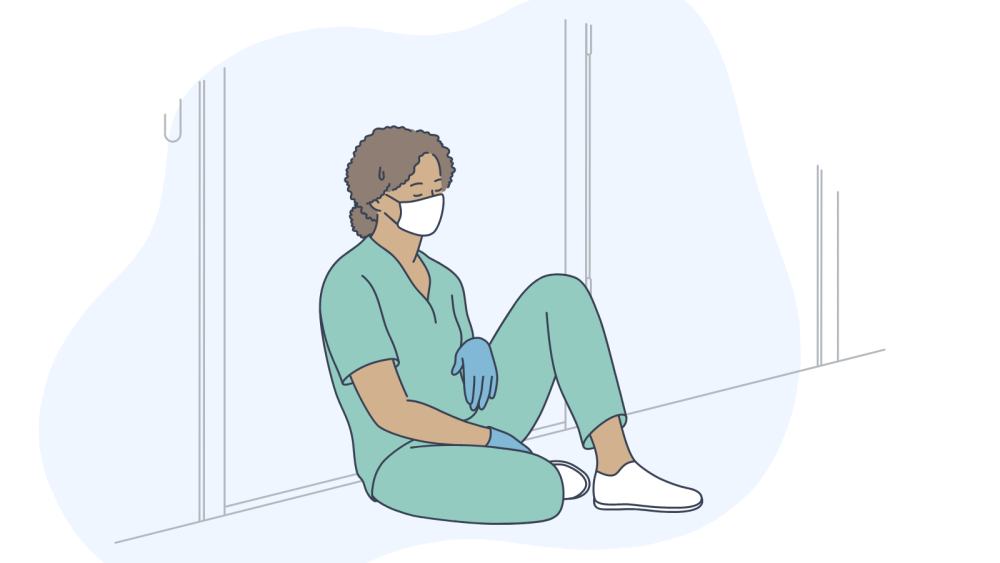The Importance of Managing Stress for Health Care Professionals
The Importance of Managing Stress for Health Care Professionals

Health care professionals should take steps to manage their stress, to prevent it from adversely affecting work performance, emotional wellbeing, and health.
Krystal M. Lewis, PhD, explains how stress affects the body and shares ideas for how health care professionals can manage the stress they experience in their professional and personal lives.
Q: What is stress, and how does it affect the body?
A: Stress is a normal part of life. There are two different types of stress: acute stress, which is short term, and chronic stress, which occurs over time. Stress can become a chronic condition if it’s not managed. Both types of stress involve physical, mental, and emotional responses to stimuli that require a change or an adjustment. These responses might be triggered by changes in the immediate environment, such as startling or loud noises, aggressive behavior, perceived threats, or specific thoughts relating to the stressors, for example, if you feel you can’t handle the situation, fear bad outcomes, or fear the unknown. The body’s defenses kick in, to protect itself from the threat.
Stress causes the body to flood the bloodstream with hormones, such as cortisol, epinephrine, and norepinephrine. These hormones prepare the body to escape or confront danger through specific reactions like increased blood pressure, changes in the muscle, increased heart rate, and increased respiration. This is often referred to as the fight-or-flight response.
There are positive aspects to our bodies being in this heightened state. We are more alert and ready to respond, and more engaged in the present moment. As a result, stress can help improve overall performance. But there’s a sweet spot to how much stress is good for you. How you respond to the challenge of situations will determine the effects of stress on your overall health.
Q: What are the symptoms of unrelieved or chronic stress?
A: Stress is experienced differently by each person, but there are general symptoms. Physical effects of chronic stress include getting very hot or sweating, feeling pain in the body, headaches or stomach aches, feeling pain in the extremities like pins and needles, or muscle twitches. Some of the emotional reactions might include feeling irritable or suddenly angry, fatigued, restless, sad, or anxious. Neurological changes include concentration difficulties and forgetfulness. Stress-related behaviors might include having more outbursts or engaging in drug and alcohol use, changes in appetite, crying, and other behaviors that show you’re feeling stress. Feeling the stress, and the impact on overall health, tends to increase in tandem with the number of stressors experienced.
Q: What are the main triggers of stress?
A: Common sources of stress are routine personal experiences or major life events, such as moving or getting married, relationship events, pregnancy, miscarriage, death—a lot of the different things that we might experience.
Stress can also result from systemic issues such as inequality in the socioeconomic determinants of health. This can mean living in poverty or lacking in basic resources such as food or shelter, lacking access to appropriate health care, and generally experiencing racism or unfair treatment. Some people experience chronic stress after an accident, abuse, or some other type of life-threatening experience.
Q: What extra stressors do health care professionals face?
A: Working in health care can be physically and emotionally demanding in normal times, let alone during a public health crisis. In addition to caring for patients with complex health problems, health care professionals might have limited access to appropriate equipment, difficulties with funding, difficulties in interpersonal relationships with colleagues, and workplaces with inadequate staffing so that they must work long hours. There is also the risk of exposure to infectious and hazardous substances. And then in general, there is the stress of dealing with patients who are very sick and possibly dying.
Health care professionals not only have their patients and their work-related stuff to worry about, but they’re also humans and they might have stresses in their personal lives. The result is that they can experience some of the same adverse effects from stress as other people do.
Q: Why is it important for health care professionals to manage their stress levels?
A: For helpers in any profession, but especially in health care, it’s hugely important to manage stress levels, because they can adversely affect decision-making abilities, reduce overall performance, and contribute to errors. The more we feel overwhelmed and anxious, the less likely it is that we’ll have access to the prefrontal cortex, which is the area of the brain that helps with rational thought, problem-solving, and decision making. If we’re feeling stressed, if we’re in a constant state of alertness and anxiety, the sympathetic nervous system is activated, which causes the barrage of physical symptoms that I mentioned earlier. These impact the ability to act in a rational, logical way, which then impacts our ability to make appropriate decisions.
Q: What strategies can health care professionals use to manage their stress levels?
A: Start with just being aware of the physical and emotional signs of stress. Pay attention to how your body talks to you—whether you’re having physical symptoms, when you’re feeling fatigued or overwhelmed, your muscles are aching, you’re getting sick more often, or you’re irritable.
It’s important to be aware of your own unique response to stress and to address the symptoms right away. It’s easy to ignore stress and let things build up, but that is counterproductive and can ultimately affect your overall effectiveness. So, it’s best to identify the stressors in your life, learn to take breaks, and manage any physical or emotional symptoms.
It’s also important to identify and address the conditions that are creating the stress. This might involve having conversations with coworkers or management, figuring out ways to reduce your responsibilities or workload if you’re feeling overwhelmed, or asking for help at home.
Self-care is important. It’s not just engaging in enjoyable activities, but it’s also figuring out how to choose healthy responses to stress. It helps to have a list of healthy and adaptive coping strategies that work for you to alleviate stress. It could be exercising such as yoga or cooking and following a good diet—healthy options as well as the occasional sweet treat.
Q: How effectively are health care professionals managing stress in these stressful times?
A: Some people are really good at setting boundaries with self-care, but especially during this pandemic, I have seen a lot more health care professionals taking on more than they normally would, working more hours, and over-exerting themselves for the sake of humanity. From talking to people and seeing my own patients who work in the medical field, I’m aware that many of them are just exhausted. What they’ve lost along the way is the importance of taking care of themselves.
Q: What do you say to remind health care professionals about the importance of managing their stress?
A: It’s like when you fly, in an emergency you must put on your own oxygen mask first before you can help other people. At your workplace, it’s taking those five minutes to go sit down somewhere and take a break, making sure you’re getting off your feet, or bringing snacks to work so you're eating appropriately. Managing stress doesn’t mean you have to take a day off and go to the beach. If you have to be at work, be mindful of the little moments you can take for yourself, so that you can keep going.
A lot of my clinical time is spent strategizing with patients: what are the small steps you can take to manage your overall stress level and your mental health so that you can continue to provide for others? I work a lot with people on cognitive restructuring—helping them identify ways that they’re thinking that aren’t productive and replacing those thoughts with more adaptive, helpful thoughts. Specific to healthcare professionals, there might be times when they’re focusing on how they messed up or feel like they are not doing enough. It’s helpful to highlight how this thinking affects how they’re feeling and their behaviors; when they’re stressed, their thoughts are more negative and maybe even anxious. I try to help them identify helpful thinking patterns and reflective self-talk, so that they can manage stress a little bit better and increase their overall self-compassion.




















